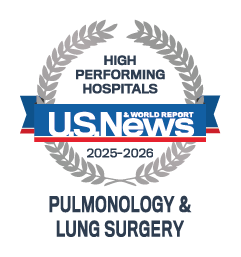Pulmonary vascular disease is a group of conditions that interfere with blood flow between the heart and lungs. There are two main types: pulmonary hypertension and pulmonary embolism. Both types can cause shortness of breath that limits physical activity and can lead to serious complications if left untreated.
Tampa General Hospital’s Advanced Lung Disease and Transplant Center within the Transplant Institute is a nationally recognized leader in the diagnosis, treatment and research of pulmonary vascular disease. Our pulmonary and lung center includes specialists in pulmonary disease, cardiology, cardiothoracic surgery and interventional radiology. Working together, we provide all-encompassing, world-class care.
What Causes Pulmonary Vascular Disease?
Each type of pulmonary vascular disease has different causes. Pulmonary hypertension is a form of high blood pressure that affects the pulmonary arteries and the right side of the heart. If blood vessels in the lungs become narrowed or blocked, blood can collect in the lungs, causing pressure to build in the pulmonary arteries. The heart must then work harder to pump blood through the lungs, which can eventually weaken the heart muscle.
Based on its underlying cause, pulmonary hypertension may be classified as:
- Idiopathic (no known cause)
- Heritable (a gene passed from parent to child)
- Congenital heart disease (present at birth)
- A left-sided heart disease, such as mitral valve disease or aortic valve disease
- A lung disease, such as COPD, emphysema or pulmonary fibrosis
- Chronic blood clotting
- Another health condition, such as a blood disorder or kidney disease
Pulmonary embolism occurs after a blood clot forms elsewhere in the body, such as in a leg or the pelvis. A piece of the clot then breaks off and travels through the bloodstream to the arteries in the lungs, where it creates a blockage.
What Are the Symptoms of Pulmonary Vascular Disease?
The most common symptom of pulmonary vascular disease is shortness of breath, which typically worsens with physical exertion.
Other symptoms can include:
- Sharp pains in the chest, shoulder, arm, neck or jaw (similar to a heart attack)
- A cough that may produce bloody mucus
- Rapid heart rate
- Excessive sweating
- Dizziness and fainting (syncope)
- Wheezing
- Pale, clammy or bluish-colored skin
- Fatigue
These symptoms can vary widely in intensity based on the cause, location and extent of the arterial damage.
How Is Pulmonary Vascular Disease Diagnosed?
Pulmonary vascular disease can be challenging to pinpoint because its symptoms often mimic those of other heart and lung conditions. As part of the diagnostic process, a physician will typically perform a medical history review and a physical examination, then order a series of tests, which may include:
- Bloodwork
- A chest X-ray, CT scan or MRI
- An electrocardiogram (ECG)
- An echocardiogram
- Right-heart catheterization
- A pulmonary function test
- A sleep study
- An open-lung biopsy
How Is Pulmonary Vascular Disease Treated?
The goals of pulmonary vascular disease treatment are to improve the symptoms, reduce the strain on the heart and lower the risk of heart failure. Depending on the specifics of the diagnosis, the patient’s age and other factors, treatment may include:
- Supplemental oxygen
- Medications, such as anticoagulants to thin the blood, thrombolytic drugs to dissolve blood clots or prostacyclins to inhibit platelet activation
- Surgery to remove a blood clot
- Lung transplantation
The latest treatment options for pulmonary vascular disease are available in TGH’s Advanced Lung Disease and Transplant Center, including groundbreaking classes of drugs and complex surgical procedures, such as thromboendarterectomy to remove blood clots and scar tissue from the pulmonary arteries. Our team is continually advancing pulmonary care by taking part in clinical trials and regularly publishing research studies.
Benefit From World-Class Pulmonary & Lung Care at TGH
At TGH, we know that no two patients or lung conditions are alike. The specialists in the Advanced Lung Disease and Transplant Center use precision medicine to provide highly personalized care, which helps each patient achieve the best possible outcome and quality of life.

